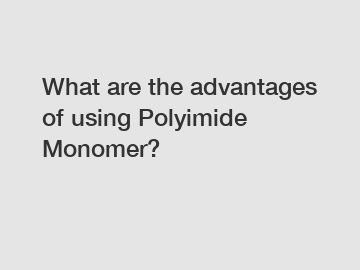What are the advantages of using Polyimide Monomer?
What are the advantages of using Polyimide Monomer?
Polyimide monomer is a versatile material that has gained popularity in various industries for its unique set of properties. From electronics to aerospace, this advanced material offers several advantages that make it a preferred choice in many applications. In this article, we will explore the key advantages of using polyimide monomer.
1. Exceptional thermal stability: One of the primary advantages of polyimide monomer is its remarkable thermal stability. It can withstand extreme temperatures, ranging from -250°C to 300°C, without undergoing any significant changes in its physical or chemical properties. This makes it an ideal choice for applications that involve high-temperature environments, such as thermal insulation, aircraft engines, and electronic components.

2. Excellent mechanical strength: Polyimide monomer exhibits excellent mechanical strength, making it highly resistant to cracking, tearing, and deformation. It has a low coefficient of thermal expansion, which means it can maintain its shape and dimensions even when exposed to temperature variations. This characteristic is particularly valuable in industries where dimensional stability is crucial, such as aerospace and automotive.
3. Outstanding chemical resistance: Another notable advantage of polyimide monomer is its exceptional resistance to various chemicals, including solvents, acids, and bases. This makes it highly suitable for applications that involve exposure to corrosive substances, such as chemical processing, oil drilling, and electronic manufacturing. Its ability to resist chemical degradation ensures the longevity and performance of the end product.
4. Low dielectric constant and high electrical insulation: Polyimide monomer possesses a low dielectric constant, which means it can minimize the loss of electrical energy in electronic circuits. Additionally, it offers excellent electrical insulation properties, preventing the flow of electric current through the material. These characteristics are valuable in the production of flexible circuit boards, wire insulation, and other electrical components.
5. Lightweight and flexible nature: Polyimide monomer is characterized by its lightweight and flexible nature, making it an excellent choice for applications that require materials with high strength-to-weight ratios and flexibility. Its ability to be easily molded into complex shapes without compromising its mechanical properties gives it an edge over other materials. In the aerospace industry, for example, polyimide monomer is used to manufacture lightweight and durable components for aircraft and spacecraft.
6. Good radiation resistance: Polyimide monomer exhibits excellent resistance to radiation, including UV radiation, gamma rays, and X-rays. This property makes it ideal for applications where the material will be exposed to radiation, such as satellite components, nuclear power plants, and medical devices. Its ability to withstand radiation ensures the reliability and longevity of the equipment.
In conclusion, the advantages of using polyimide monomer are vast and make it a highly desirable material across various industries. Its exceptional thermal stability, excellent mechanical strength, outstanding chemical resistance, low dielectric constant, high electrical insulation, lightweight and flexible nature, and good radiation resistance position it as a go-to material for many applications. As technology continues to evolve, the demand for polyimide monomer is expected to rise, further cementing its role as a key material in numerous industrial sectors.
If you want to learn more, please visit our website 3,3',4,4'-Biphenyltetracarboxylic dianhydride, CAS 2420-87-3, Tsaker Group.
206
0
0

Comments
All Comments (0)